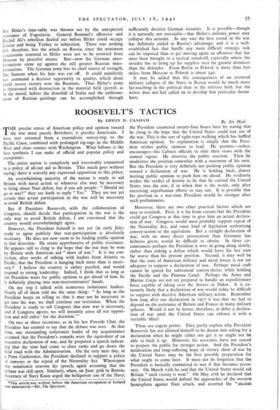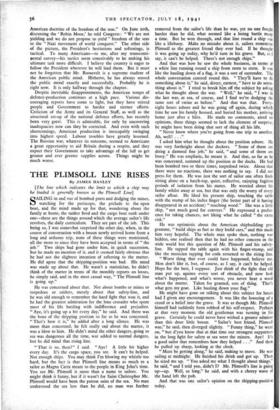ROOSEVELT'S TACTICS
By ERWIN D CAN HA1■1
THE precise status of American policy and opinion toward the war must puzzle Britishers; it puzzles Americans. I have just returned from a journalistic survey-trip to the Pacific Coast, combined with prolonged zig-zags in the Middle West and close contact with Washington. What follows is the best synthesis I can make of official and popular policy and viewpoints: The entire nation is completely and irrevocably committed to a policy of all-out aid to Britain. This much goes without saying; there is scarcely any expressed opposition to this policy.
An overwhelming majority of the nation is ready to aid Britain with naval action or whatever else may be necessary to bring about Nazi defeat, but if you ask people: " Should we go to war?" they are loath to reply " Yes." They are not yet certain that actual participation in the war will be necessary to avoid British defeat.
But if President Roosevelt, with the collaboration of Congress, should decide that participation in the war is the only- way to avoid British defeat, I am convinced that the country would overwhelmingly agree.
However, the President himself is not yet (in early July) ready to agree publicly that war-participation is absolutely necessary. He does not now seem to be leading public opinion in that direction. He seems apprehensive of public resistance. He appears still to cling to the hope that the war may be won by Britain with American aid " short of war." It is my con- viction, after weeks of talking with leaders from Atlantic to Pacific, that the President is hanging back more than is neces- sary.* I believe the country is rather puzzled, and would respond to strong leadership. Indeed, I think that so long as the President waits for public opinion to get ahead of him, he is definitely playing into non-interventionists' hands.
On my trip I talked with numerous isolationist leaders. Nearly all of them told me the same thing : " As long as the President keeps on telling us that it may not be necessary to get into the war, we shall continue our resistance. When the President is ready to tell Congress that now war is necessary, and if Congress agrees, we will instantly cease all our opposi- tion and will enlist ' for the duration.' " On two or three occasions, as in his last Fireside Chat, the President has seemed to say that the debate was over. At that time, one outstanding isolationist leader of my acquaintance assumed that the President's remarks were the equivalent of an executive declaration of war, and he prepared a speech indicat- ing that the time had come to close ranks and go down the fatal road with the Administration. On the very next day, in a Press Conference, the President declined to support a policy of convoys or the repeal of the Neutrality Act. Whereupon the isolationist rewrote his speech, again assuming that the debate was still open. Similarly, when, on June 3oth in Boston, Secretary of Navy Knox urged the belligerent use of the Navy,
*This article was written before the American occupation of Iceland was announced.—ED. The Spectator.
By Air Mail. the President countered twenty-four hours later by stating that he clung to the hope that the United States could stay out of the war. This is the sort of tight-rope walking which has baffled American opinion. Its explanation is simply that the Presi- dent wishes public opinion to lead. He permits—rather, encourages—his Cabinet officials to state their views with the utmost vigour. He observes the public reaction. Then he moderates the position somewhat with a statement of his own. But the President is very definitely not pushing public opinion toward a declaration of war. He is holding back, almost inviting public opinion to push him on ahead. He evidently wishes the verdict of history to be that he carried the United States into the war, if or when that is the result, only after exercising superhuman efforts to stay out. It is possible that his position as a war-time President would be stronger after such preliminaries.
Moreover, there are two other practical factors which are easy to overlook. First, it is far from certain that the President could get Congress at this time to give him an actual declara- tion of war. Congress would most probably support repeal of the Neutrality Act, and some kind of legislation authorising convoy-action or the equivalent. But a straight declaration of war, with no more direct provocation than Germany has hitherto given, would be difficult to obtain. In those cir- cumstances perhaps the President is wise in going along slowly, rather than risking a defeat which would leave his last state far worse than his present position. Second, it may well be that the state of American military and naval forces is not yet adequate to support a declaration of war. Perhaps naval craft cannot be spared for substantial convoy-duties while holding the Pacific and the Panama Canal. Perhaps the Army and Marine Corps are not yet prepared to handle an expeditionary force capable of taking over the Azores or Dakar. It is ex- tremely likely that a declaration of war would today be difficult to support with decisive American military action. Remember how long after our declaration in 1917 it was that we had to depend on the assistance of Britain and France in many military spheres. Would it not be better, therefore, to defer a declara- tion of war until the United States can enforce it with a veritable blitz?
These are cogent points. They partly explain why President Roosevelt has not allowed himself to be drawn into asking for a declaration when he might either not get it or might not be able to back it up. However, his associates have not ceased to prepare the public for stronger action. And the President's moderation and long-suffering hope of victory short of war by the United States may be the best possible preparation for what ought to come later. It must not be forgotten that the President is basically committed to war if that becomes neces- sary. On March 15th he said that the United States would aid Britain " until victory is won." On May 27th he declared that the United States would defend the approaches of the western hemisphere against Nazi attack, and asserted the " ancient American doctrine of the freedom of the seas." On June 20th, discussing the ' Robin Moor,' he told Congress: " We are not yielding and we do not propose to yield " freedom of the seas to the " Nazi movement of world conquest." The other side of the picture, the President's hesitations and softenings, is tactical. To many Americans—to me, after my transconti- nental survey—his tactics seem conceivably to be making his ultimate task more difficult. I believe the country is eager to follow the President wherever he will lead them. But it must not be forgotten that Mr. Roosevelt is a supreme student of the American public mind. Hitherto, he has always sensed the public mood exactly and successfully. Probably he is right now. It is only halfway through the chapter.
Despite inevitable disappointments, the American tempo of defence-production continues at a high pace. Various dis- couraging reports have come to light, but they have stirred people and Government to harder and sterner efforts. Criticism of the Army and its General Staff, as well as the structural set-up of the national defence efforts, has recently been very great. This is admirable, for only by uncovering inadequacies now can they be corrected. And even with such shortcomings, American production is inescapably swinging into highest speed. Labour troubles have greatly lessened. The Russian war, whatever its outcome, seemed to Americans a great opportunity to aid Britain during a respite, and they expect their Government to take advantage of the lull to get greater and ever greater supplies across. Things might be much worse.


























 Previous page
Previous page